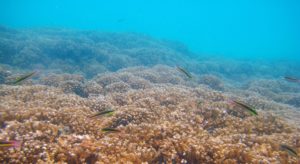Researching the ocean allows us to better understand it, and ultimately better protect it. While I am not currently a practicing Marine Biologist, I have a had a diverse array of experiences working in the world of research science. Presently, I work with ocean science and conservation groups to help communicate their research to the world.
Research Assistant: Antarctic SeaScience Expedition, National Science Foundation
I assisted Dr. Richard Aronson and Dr. Katie Smith during a 2015 National Science Foundation funded expedition assessing the threat of novel marine predators like king crabs off the Western Antarctic Peninsula caused by a rapidly changing climate and warming ocean temperatures. For my contribution to the expedition’s success, I was included as an author in Ecological Society of America in our most recent open-source journal publication.

Research Assistant: Marine Paleoecology Lab, Florida Institute of Technology
I assisted Dr. Lauren Toth and Dr. Richard Aronson in studying Holocene reef growth in the Tropical Eastern Pacific, analyzing the effects of past climatic variability and upwelling regimes on the health of coral reefs through time. Additionally, I conducted my own undergraduate research analyzing the dynamics of coral-reef associates in Pacific Panama through time, specifically urchin and sponge populations.

Research Assistant: Scripps Institution of Oceanography
I assisted Dr. Andrew Nosal in studying the large seasonal aggregation of leopard sharks in La Jolla, California in order to better understand their demography, movement patterns, mating systems, and behaviors. I was often diving in order to retrieve acoustic receiver data, as well as catching and tagging leopard sharks using hand lines. I also traveled to Santa Catalina Island to take tissue samples from the population of leopard sharks there, to compare with the La Jolla population.

Assistant Field Scientist: NOAA Southwest Fisheries Science Center
On this two week long research cruise, I helped monitor the abundance, distribution, and age of shark species in the Southern California Bight during SWFSC’s annual shark survey cruise. We also caught, measured, and preserved many opah specimens, which upon later analysis led to the discovery that it is the only known warm-bodied fish in the world.

Research Assistant: Operation Wallacea Indonesia
I completed a coral reef ecology course and assisted PhD candidates in gathering field data. This included things like behavior and interaction of fiddler crab species, coral recruitment growth rates, nudibranch to sponge ratios, and anemone fish behavior. To do so, I dove at least two times a day for five weeks.
“The greatest threat to the ocean, and thus to ourselves, is ignorance. But we can do something about that.” -Sylvia Earle
